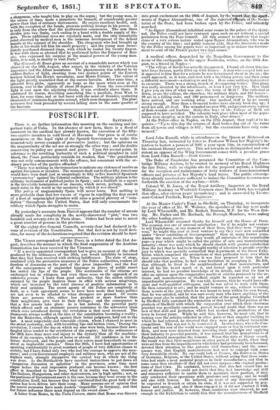The Vienna correspondent of the Times, in a letter dated
the 31st Au- gust, describes the manner in which the final suppression of the Austrian Constitution has been received by the Viennese. "If a newly-appointed correspondent had to give an account of the effect produced by the ordinances of the 20th, you would infallibly be informed that they had been received with striking indifference. The state of siege, combined with the preventive measures of the Police authorities, renders all freedom of discussion on the part of the press impossible ; and the fear of the consequences of unguarded language in places of public resort has sealed the lips of the people. The sentiments of the citizens are exchanged but in whispers, and even these cease on the approach of an unknown person. I learn from good authority, that the sullen attitude assumed by the people inspires those in office with serious misgivings, which are increased by the total absence of positive information as to their real opinions. The secret agents of the Police are completely at fault, as a tacit agreement seems to have been made that home politics are not even to be alluded to when strangers are present. Of course there are persons who, either less prudent or more fearless than their neighbours, give vent to their feelings ; and the consequence is that a few arrests take place. As is but natural, the powerful party which offered such an obstinate passive resistance to the subversive ideas which were introduced during the revolution is that most incensed. The Democrats always scoffed at the idea of the constitution becoming a reality ; but the Moderates, although against their better judgment, held out to the last. A most respectable and venerable citizen, whom I chanced to meet in the street yesterday, said, with trembling lips and broken voice, 'During the revolution, I cursed the day on which my sons were born, because their new- fangled ideas tended to the overthrow of the empire; but the ordinances of the 20th have done more real injury to the dynasty than all the machina- tions of its enemies, whether at home or abroad. All confidence is for the future destroyed, and the people and their rulers must henceforth be consi- dered as implacable enemies.' Since the 26th, I have had opportunities of speaking confidentially to great numbers of people of very different classes in society, but I have found only two who had the courage to approve the mea- sures; and even Government employes and military men, who are not of the highest rank, strongly disapprove the cynical way in which the thing was done. As the Statthalters have received instructions to put down all 'dangerous discussion or agitation' in the provinces, some time must elapse before the real impression produced can become known ; the first -effect is described to have been, what it in reality was here, stunning. The Italians, Hungarians, and other malcontents, are in high spirits ; not, as The partisans of Government assert is the case, because they were averse to the .constitution itself, but because they feel convinced that the great bulk of the nation has been driven into their camp. Many persons are of opinion that the recent measures have made Austria 'impossible' in Germany, and that her future influence there must depend on the sword alone." A letter from Rome, in the Paris Univers, states that Rome was thrown
into great excitement on the 26th of August, by the that the iparl-
meats of Signor Alessandroni, one of the superial s of the Secits=" tariat of the State, had been broken open by the Police, mid-minutely searched.
"As Signor Alessandroni inhabited some rooms in the palace of the Quiri- nal, the Police could not have ventured upon such an act without a special permission from the Pope himself. All this seemed to indicate that suspi- cions of a very serious nature rested upon Signor Alessandroni, who was in the country at the time; and public rumour adds, that the discoveries made by the Pohce among his papers were so important as to induce the Govern- ment to send off the French packet two days sooner."
A medical officer, despatched by the Neapolitan Government to the scene of the earthquake in the upper Basilicata, writes, on the 20th Au- gust, to a friend in Naples— "The village of Bavile has actually disappeared. I found all about this dis- trict large fissures, partly filled up with houses. A man who escaped told mu it appeared to him that for a minute he was being tossed about in the air ; the earth appeared, as it were, endowed with a breathing power, and then came a different movement—a shaking to and fro. Here some military bad arrived to excavate. There was a strong stench of decomposing bodies. This place was really deserted by the inhabitauts, at least I saw very few. How shall I give you an idea of what was once the town of Meld ? The cathedral is down, as are the college, the churches, the military thIpet, and 163 houses- 98 are in a falling state, and 180 pronounced as dangerous. The military have arrived and are working away. Our medical staff is by no means strong enough. More than a thousand bodies have already been dug up ; I need not add, all dead. The wounded are over 600, and present every variety of flesh-wounds and fracture. Sixty-five boys of the College of Mel fi are supposed to have perished. The calamity took place when most of the popu- lation were sleeping, as is the custom in Italy, after dinner."
At the Police-office in Naples, on the 27th August, they replied to in- quiries—" Up to this day the returns of dead bodies dug out of the ruins from all towns and villages is 857; but the excavations have only com- menced."


























 Previous page
Previous page